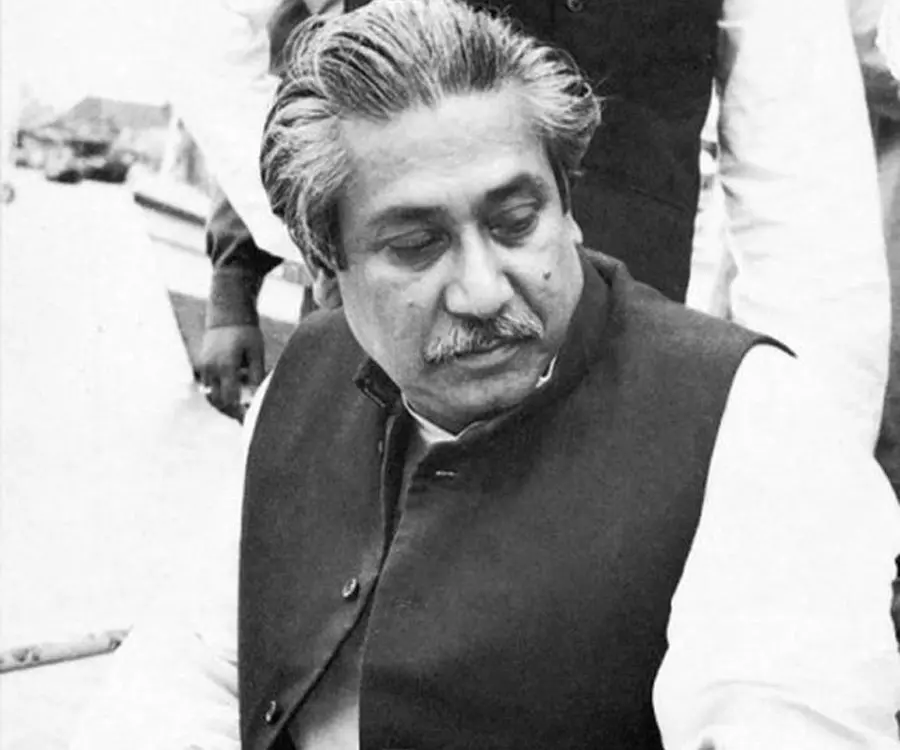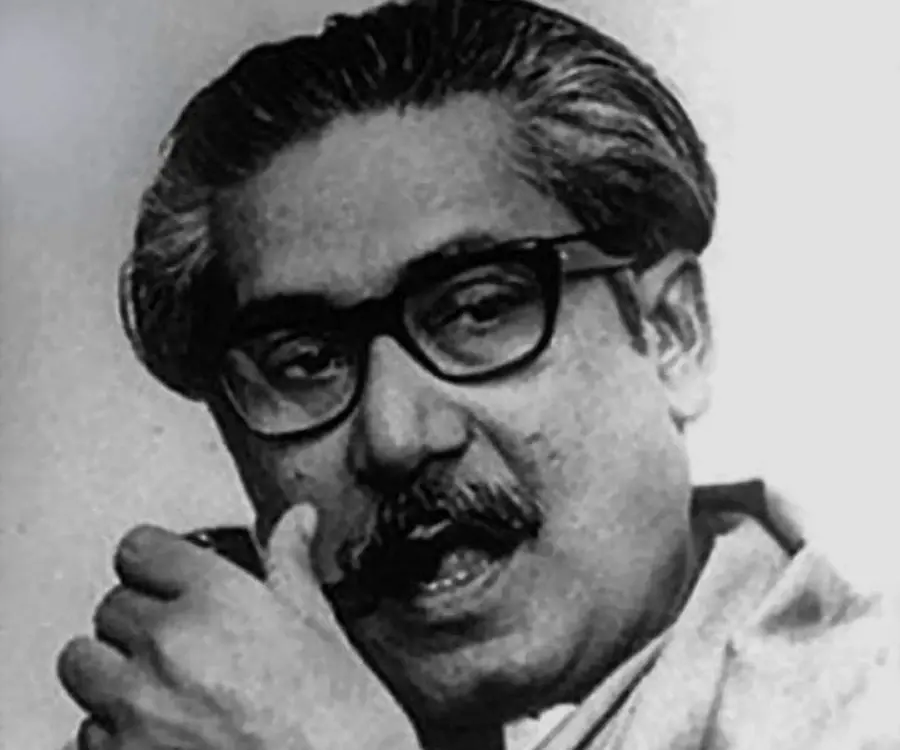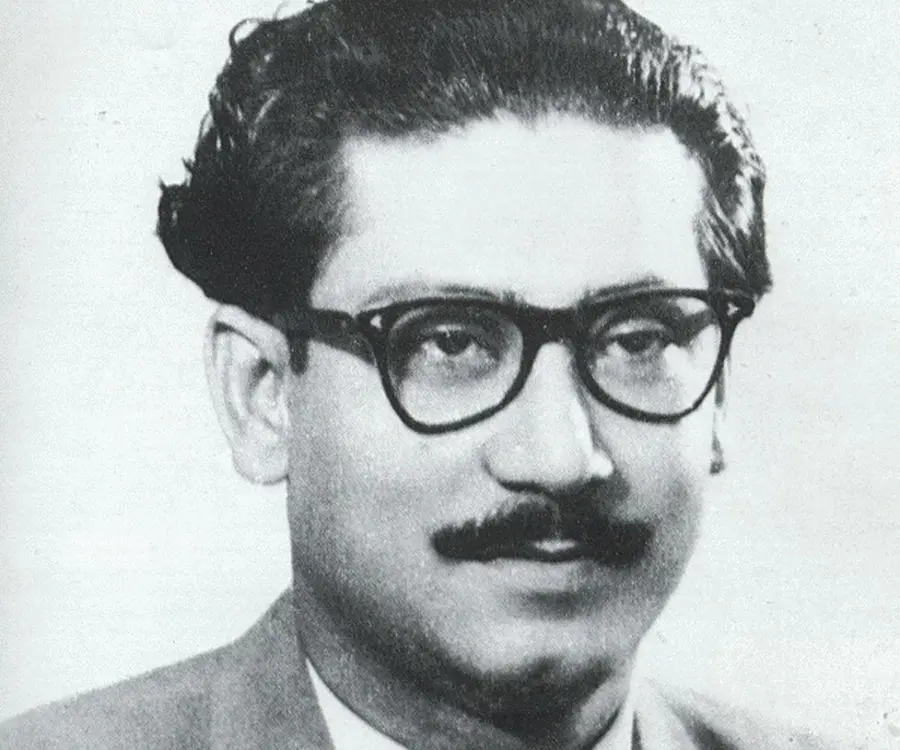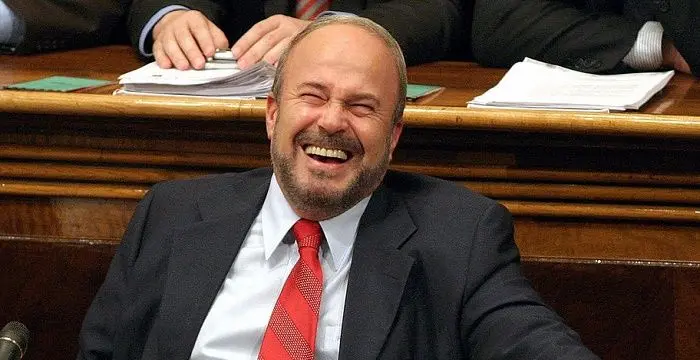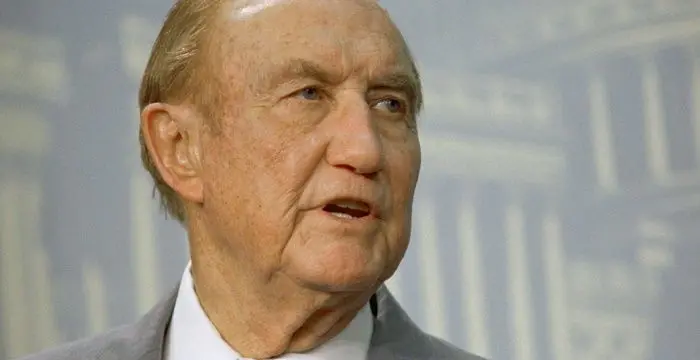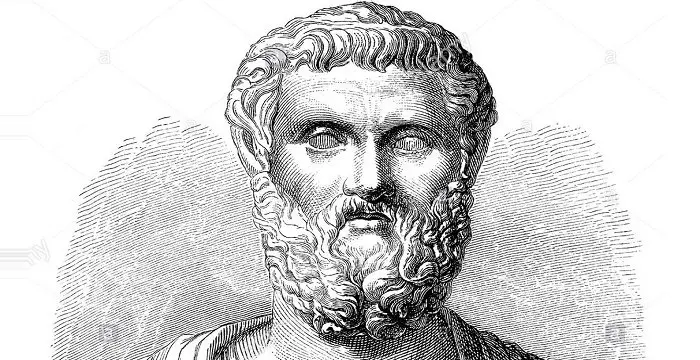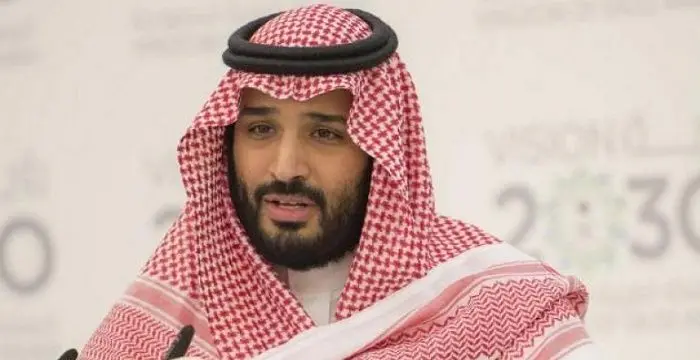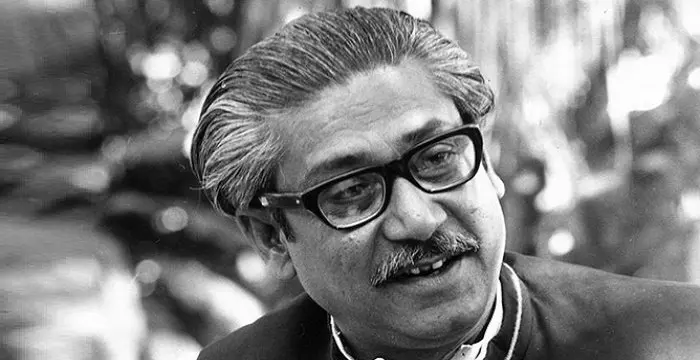
Sheikh Mujibur Rahman - First Prime Minister of Bangladesh, Family and Family
Sheikh Mujibur Rahman's Personal Details
Sheikh Mujibur Rahman was the ‘Father of the Nation’ of Bangladesh
| Information | Detail |
|---|---|
| Birthday | March 17, 1920 |
| Died on | August 15, 1975 |
| Nationality | Bangladeshi |
| Famous | Leaders, Political Leaders, Prime Ministers, First Prime Minister of Bangladesh |
| Spouses | Sheikh Fazilatunnesa Mujib |
| Known as | Mujib, Bangabandhu |
| Childrens | Sheikh Hasina |
| Universities |
|
| Founder / Co-Founder |
|
| Cause of death |
|
| Birth Place | Tungipara Upazila |
| Religion | Islam, Sunni Islam |
| Gender | Male |
| Sun Sign | Pisces |
| Born in | Tungipara Upazila |
| Famous as | First Prime Minister of Bangladesh |
| Died at Age | 55 |
Sheikh Mujibur Rahman's photo
Who is Sheikh Mujibur Rahman?
Sheikh Mujibur Rahman was the ‘Father of the Nation’ of Bangladesh. Often referred as ‘Mujib’ or ‘Sheikh Mujib’, he was prime architect of the independent nation, Bangladesh. He played a prominent role in countering exploitation and other unjust actions of the power holders of West Pakistan towards people of East Pakistan. As a zealous orator, he gained popularity for advocating socialism and detesting institutional and ethnic inequality posed by Pakistan. He chalked out an autonomy plan encompassing six points during the factional tensions in 1966. His political views often landed him up in jail which never deterred him from vehemently challenging military dictatorship of Ayub Khan, the then Field Marshal of Pakistan. Although the ‘Awami League’ won the first democratic election of Pakistan under his leadership, the party was not invited for forming the government. Following mass protests against such discrimination and launch of civil disobedience movement by Mujib, ‘Operation Searchlight’ was conducted by the Pakistan Army and Mujib was arrested and moved from East Pakistan to West Pakistan. The ‘Bangladesh Liberation War’ followed and Pakistan had to surrender to the Bangladesh-India Allied Forces. Mujib was freed and became the first Prime Minister of independent Bangladesh. Mujib and most of his family members were assassinated in a military coup initiated by treacherous army men. Sheikh Hasina, the eldest daughter of Mujib is the present Prime Minister of Bangladesh.
// Famous Leaders
Edi Rama
Edi Rama is the current Prime Minister of Albania. Check out this biography to know about his childhood, life, achievements, works & timeline.
Tecumseh
Tecumseh was a Native American leader of the Shawnee clan. This biography profiles his childhood, life and timeline.
Khalifa bin Zayed Al Nahyan
Sheikh Khalifa bin Zayed Al Nahyan is the current President of the United Arab Emirates (UAE). Check out this biography to know about his birthday, childhood, family life, achievements and fun facts about him.
Childhood & Early Life
He was born on March 17, 1920, in Tungipara village in Gopalgunj subdivision of Faridpur district, in the state of Bengal in British India. He was born as one of six children of Sheikh Luthfur Rahman and Saira Begum. His father was an officer in Gopalgunj civil court.
In 1927 he was enrolled at the ‘Gimadanga Primary School’ and after two years he joined the ‘Gopalganj Public School’ in class three. In 1931 he was enrolled in class four at the ‘Madaripur Islamia High School’.
He had to drop out from school in 1934 due to eye surgery and his slow recovery posed hindrance in resuming school which he could do after four years.
His political calling effectually commenced in 1939 when he was studying at ‘Gopalganj Missionary School’. When Chief Minister of undivided Bengal, A.K. Fazlul Haque and Huseyn Shaheed Suhrawardy visited the school campus, a group of students under his leadership demanded repair of damaged roof of the school.
In 1940 he joined the ‘All India Muslim Students Federation’ and was elected councillor for a term of one year.
After passing the entrance exam he enrolled at Calcutta Islamia College (at present ‘Maulana Azad College’) in 1942 and got involved in students politics.
In 1943 he became a member of the ‘Bengal Muslim League’ and toiled actively to accomplish the League’s mission of a distinct Muslim state of Pakistan.
He became general secretary of the ‘Islamia College Students Union’ in 1946.
In 1947 he completed his degree and emerged among the Muslim politicians who worked under the leadership of Huseyn Shaheed Suhrawardy at the break of the 1946 communal violence that erupted in Calcutta. He strived to repress violence while safeguarding the Muslims.
Following the Partition of India, he joined the ‘University of Dhaka’ in the then East Pakistan as a law student and on January 4, 1948 he founded the ‘East Pakistan Muslim Students' League’.
In 1948, when the province chief minister Khwaja Nazimuddin and Muhammad Ali Jinnah announced that Bengalis of East Pakistan will accept Urdu as the state language, a wave of intense outcry permeated East Pakistan. Mujib immediately launched strong protests and initiated communication with other political leaders and students.
On March 2, 1948, a meeting was held by several political parties to counter the language issue and on March 11 a general strike was called by the ‘Action Council’ to mark a dissent opposing ‘Muslim League’s’ conspiracy against Bengal. Mujib was arrested that day along with other leaders but strong student movement compelled ‘Muslim League’ government to release him and others on March 15.
Career
He faced expulsion from the university and in 1949 was arrested for organising an agitation with the clerical and other menial staffs of ‘Dhaka University’ on the issue of rights of the workers.
On June 23, 1949, he joined the Bengali nationalists Suhrawardy, Maulana Bhashani and others to form the ‘East Pakistan Awami Muslim League’. He was made the joint secretary while in confinement and was released at the end of June.
He became the general secretary of the party on July 9, 1953 and next year he was elected a member of ‘East Bengal Legislative Assembly’ on the ticket of the coalition ‘United Front’.
On May 15, 1954 he became the agricultural and forest minister only for few days till May 29 when the ministry of the ‘United Front’ was expeditiously dismissed by the Central Government. He was again arrested on May 30 and released on December 23.
From 1955 to 1958 he remained an elected member of the second ‘Constituent Assembly of Pakistan’. In 1956 the ‘One Unit’ plan was implemented where western provinces were merged as ‘West Pakistan’ and ‘East Bengal’ became a part of ‘One Unit’ rechristened as ‘East Pakistan’. In 1956 he became the minister of commerce, industries, labour, village aid and anti-corruption but resigned in 1957.
General Ayub Khan enforced martial law on October 7, 1958 suspending the constitution. On October 11 and s Mujib was arrested. During this time he initiated ‘Swadhin Bangla Biplobi Porishad’ an underground organisation to counter the atrocities of Ayub Khan and his martial regime and to achieve an independent Bangladesh.
After the death of Suhrawardy in 1963, he became the head of ‘Awami Muslim League’ which was re-christened as ‘Awami League.
On February 5, 1966, he put forward a six point plan titled, ‘Our Charter of Survival’ before a selected committee during a national conference of opposition parties held at Lahore. It was an obvious charter of independence of Bengal as a nation. He became the President of ‘Awami League’ on March 1 and toured across the nation to promote and gain support for the six point plan while facing several arrests.
In 1968 the infamous ‘Agartala Conspiracy Case’ was inflicted against Mujib and several others. While they were confined at the ‘Dhaka Cantonment’, a mass insurrection followed including agitation, protests, curfews, police firings and casualties. The central government finally gave in and on February 22, 1969, Mujib and others were released. He received public acclamation as ‘Bangabandhu’ on February 23 in a mass reception. On December 5, he declared that East Pakistan will be known as Bangladesh from that time.
Although ‘Awami League’ won the democratic election of Pakistan held on December 7, 1970, with an absolute majority under his leadership, the party was not invited to form government.
Mass protests against such discrimination followed and a civil disobedience movement was initiated by Mujib in 1971 who called for independence of Bangladesh. ‘Operation Searchlight’ was conducted by Pakistan Army and Mujib was arrested and moved to West Pakistan. The ‘Bangladesh Liberation War’ followed and Pakistan had to surrender to Bangladesh-India Allied Forces.
Mujib was released on January 8, 1972 following which he met Edward Heath, the then British Prime Minister in London, addressed international media, went to India to meet Indian President Varahagiri Venkata Giri and Prime Minister Indira Gandhi and other cabinet members and then came back to Dhaka where he received a heart warming welcome.
He first became the President of the provisional government of Bangladesh and later took charge as the Prime Minister. The after-effect of rampage posed by the army of Pakistan witnessed the young Bangladesh in the middle of carnage in every way. The Bangladeshi army was gradually formed. Rigorous rehabilitation and other measures to bring the nation into normalcy were undertaken.
Mujib played an instrumental role in Bangladesh’s inclusion in the ‘Non-Aligned Movement’ and also into the ‘United Nations’. He visited several countries including the UK and the US and sought human as well as economic support for Bangladesh. In this pursuit he signed a friendship treaty with India.
Gradually the nation recovered with Mujib playing a prominent role but the disastrous famine of 1974 in Bangladesh including other national issues infused dissent against his government. He was accused of nepotism while political and social unrest continued resulting in an upsurge in violence. He was blamed for killing forty thousand people by his ‘Rakkhi Bahini’. Finally an emergency was declared.
Mujib and most of his family members were assassinated on August 15, 1975 in a military coup initiated by treacherous army men and discontented members of ‘Awami League’. Daughters of Mujib however escaped the murder plot as they were in Germany.
Personal Life & Legacy
In 1938 he married Begum Fazilatunnesa. The couple had three sons - Sheikh Kamal, Sheikh Jamal and Sheikh Russel and two daughters - Sheikh Hasina and Sheikh Rehana.
// Famous Prime Ministers
Edi Rama
Edi Rama is the current Prime Minister of Albania. Check out this biography to know about his childhood, life, achievements, works & timeline.
Leo Varadkar
Cam Leo Varadkar is the current Taoiseach—the Prime Minister—of the Republic of Ireland. Check out this biography to know about his childhood, family life, achievements and other facts about his life.
Fatos Nano
Fatos Nano is an Albanian politician who served as Prime Minister of Albania for several times. Check out this biography to know about his childhood, life, achievements, works & timeline.
Sheikh Mujibur Rahman biography timelines
- // 17th Mar 1920He was born on March 17, 1920, in Tungipara village in Gopalgunj subdivision of Faridpur district, in the state of Bengal in British India. He was born as one of six children of Sheikh Luthfur Rahman and Saira Begum. His father was an officer in Gopalgunj civil court.
- // 1927 To 1931In 1927 he was enrolled at the ‘Gimadanga Primary School’ and after two years he joined the ‘Gopalganj Public School’ in class three. In 1931 he was enrolled in class four at the ‘Madaripur Islamia High School’.
- // 1934He had to drop out from school in 1934 due to eye surgery and his slow recovery posed hindrance in resuming school which he could do after four years.
- // 1938In 1938 he married Begum Fazilatunnesa. The couple had three sons - Sheikh Kamal, Sheikh Jamal and Sheikh Russel and two daughters - Sheikh Hasina and Sheikh Rehana.
- // 1939His political calling effectually commenced in 1939 when he was studying at ‘Gopalganj Missionary School’. When Chief Minister of undivided Bengal, A.K. Fazlul Haque and Huseyn Shaheed Suhrawardy visited the school campus, a group of students under his leadership demanded repair of damaged roof of the school.
- // 1940In 1940 he joined the ‘All India Muslim Students Federation’ and was elected councillor for a term of one year.
- // 1942After passing the entrance exam he enrolled at Calcutta Islamia College (at present ‘Maulana Azad College’) in 1942 and got involved in students politics.
- // 1943In 1943 he became a member of the ‘Bengal Muslim League’ and toiled actively to accomplish the League’s mission of a distinct Muslim state of Pakistan.
- // 1946He became general secretary of the ‘Islamia College Students Union’ in 1946.
- // 1946 To 1947In 1947 he completed his degree and emerged among the Muslim politicians who worked under the leadership of Huseyn Shaheed Suhrawardy at the break of the 1946 communal violence that erupted in Calcutta. He strived to repress violence while safeguarding the Muslims.
- // 1948In 1948, when the province chief minister Khwaja Nazimuddin and Muhammad Ali Jinnah announced that Bengalis of East Pakistan will accept Urdu as the state language, a wave of intense outcry permeated East Pakistan. Mujib immediately launched strong protests and initiated communication with other political leaders and students.
- // 4th Jan 1948Following the Partition of India, he joined the ‘University of Dhaka’ in the then East Pakistan as a law student and on January 4, 1948 he founded the ‘East Pakistan Muslim Students' League’.
- // 2nd Mar 1948On March 2, 1948, a meeting was held by several political parties to counter the language issue and on March 11 a general strike was called by the ‘Action Council’ to mark a dissent opposing ‘Muslim League’s’ conspiracy against Bengal. Mujib was arrested that day along with other leaders but strong student movement compelled ‘Muslim League’ government to release him and others on March 15.
- // 1949He faced expulsion from the university and in 1949 was arrested for organising an agitation with the clerical and other menial staffs of ‘Dhaka University’ on the issue of rights of the workers.
- // 23rd Jun 1949On June 23, 1949, he joined the Bengali nationalists Suhrawardy, Maulana Bhashani and others to form the ‘East Pakistan Awami Muslim League’. He was made the joint secretary while in confinement and was released at the end of June.
- // 9th Jul 1953He became the general secretary of the party on July 9, 1953 and next year he was elected a member of ‘East Bengal Legislative Assembly’ on the ticket of the coalition ‘United Front’.
- // 15th May 1954On May 15, 1954 he became the agricultural and forest minister only for few days till May 29 when the ministry of the ‘United Front’ was expeditiously dismissed by the Central Government. He was again arrested on May 30 and released on December 23.
- // 7th Oct 1958General Ayub Khan enforced martial law on October 7, 1958 suspending the constitution. On October 11 and s Mujib was arrested. During this time he initiated ‘Swadhin Bangla Biplobi Porishad’ an underground organisation to counter the atrocities of Ayub Khan and his martial regime and to achieve an independent Bangladesh.
- // 1963After the death of Suhrawardy in 1963, he became the head of ‘Awami Muslim League’ which was re-christened as ‘Awami League.
- // 5th Feb 1966On February 5, 1966, he put forward a six point plan titled, ‘Our Charter of Survival’ before a selected committee during a national conference of opposition parties held at Lahore. It was an obvious charter of independence of Bengal as a nation. He became the President of ‘Awami League’ on March 1 and toured across the nation to promote and gain support for the six point plan while facing several arrests.
- // 1968 To 22nd Feb 1969In 1968 the infamous ‘Agartala Conspiracy Case’ was inflicted against Mujib and several others. While they were confined at the ‘Dhaka Cantonment’, a mass insurrection followed including agitation, protests, curfews, police firings and casualties. The central government finally gave in and on February 22, 1969, Mujib and others were released. He received public acclamation as ‘Bangabandhu’ on February 23 in a mass reception. On December 5, he declared that East Pakistan will be known as Bangladesh from that time.
- // 7th Dec 1970Although ‘Awami League’ won the democratic election of Pakistan held on December 7, 1970, with an absolute majority under his leadership, the party was not invited to form government.
- // 1971Mass protests against such discrimination followed and a civil disobedience movement was initiated by Mujib in 1971 who called for independence of Bangladesh. ‘Operation Searchlight’ was conducted by Pakistan Army and Mujib was arrested and moved to West Pakistan. The ‘Bangladesh Liberation War’ followed and Pakistan had to surrender to Bangladesh-India Allied Forces.
- // 8th Jan 1972Mujib was released on January 8, 1972 following which he met Edward Heath, the then British Prime Minister in London, addressed international media, went to India to meet Indian President Varahagiri Venkata Giri and Prime Minister Indira Gandhi and other cabinet members and then came back to Dhaka where he received a heart warming welcome.
- // 1974Gradually the nation recovered with Mujib playing a prominent role but the disastrous famine of 1974 in Bangladesh including other national issues infused dissent against his government. He was accused of nepotism while political and social unrest continued resulting in an upsurge in violence. He was blamed for killing forty thousand people by his ‘Rakkhi Bahini’. Finally an emergency was declared.
- // 15th Aug 1975Mujib and most of his family members were assassinated on August 15, 1975 in a military coup initiated by treacherous army men and discontented members of ‘Awami League’. Daughters of Mujib however escaped the murder plot as they were in Germany.
// Famous Political Leaders
Edi Rama
Edi Rama is the current Prime Minister of Albania. Check out this biography to know about his childhood, life, achievements, works & timeline.
Khalifa bin Zayed Al Nahyan
Sheikh Khalifa bin Zayed Al Nahyan is the current President of the United Arab Emirates (UAE). Check out this biography to know about his birthday, childhood, family life, achievements and fun facts about him.
Leo Varadkar
Cam Leo Varadkar is the current Taoiseach—the Prime Minister—of the Republic of Ireland. Check out this biography to know about his childhood, family life, achievements and other facts about his life.
Strom Thurmond
Strom Thurmond was an American politician, who represented the state of South Carolina in the United States senate for 48 years.
Solon
Solon was an Athenian lawmaker, poet and politician. He is considered as one of the ‘Seven Wise Men’ in Greek culture. This biography provides detailed information about his childhood, life, career, works, achievements and timeline.
Mohammed bin Salman
Mohammed bin Salman is the Crown Prince of Saudi Arabia and the heir apparent to the throne. Check out this biography to know about his childhood, family life, achievements and other facts about him.
Sheikh Mujibur Rahman's FAQ
What is Sheikh Mujibur Rahman birthday?
Sheikh Mujibur Rahman was born at 1920-03-17
When was Sheikh Mujibur Rahman died?
Sheikh Mujibur Rahman was died at 1975-08-15
Where was Sheikh Mujibur Rahman died?
Sheikh Mujibur Rahman was died in Dhaka
Which age was Sheikh Mujibur Rahman died?
Sheikh Mujibur Rahman was died at age 55
Where is Sheikh Mujibur Rahman's birth place?
Sheikh Mujibur Rahman was born in Tungipara Upazila
What is Sheikh Mujibur Rahman nationalities?
Sheikh Mujibur Rahman's nationalities is Bangladeshi
Who is Sheikh Mujibur Rahman spouses?
Sheikh Mujibur Rahman's spouses is Sheikh Fazilatunnesa Mujib
Who is Sheikh Mujibur Rahman childrens?
Sheikh Mujibur Rahman's childrens is Sheikh Hasina
What was Sheikh Mujibur Rahman universities?
Sheikh Mujibur Rahman studied at University of Calcutta, University of Dhaka, Maulana Azad College
Which company or organization was founded by Sheikh Mujibur Rahman?
Sheikh Mujibur Rahman was the founder/co-founder of Islamic Foundation Bangladesh, Bangladesh Krishak Sramik Awami League, Bangladesh Atomic Energy Commission, Bangladesh Chhatra League
What is Sheikh Mujibur Rahman's cause of dead?
Sheikh Mujibur Rahman dead because of Assassination
What is Sheikh Mujibur Rahman's religion?
Sheikh Mujibur Rahman's religion is Islam, Sunni Islam
What is Sheikh Mujibur Rahman's sun sign?
Sheikh Mujibur Rahman is Pisces
How famous is Sheikh Mujibur Rahman?
Sheikh Mujibur Rahman is famouse as First Prime Minister of Bangladesh
